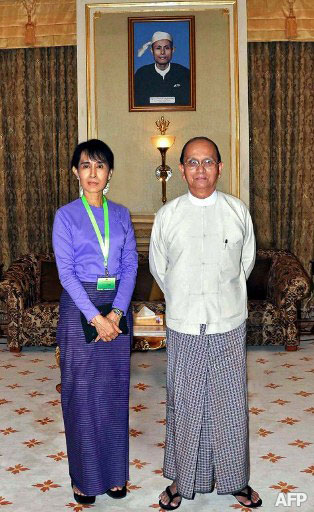As Burma is pressured to address the simmering Rhoingya issue and long-term ethnic peace, Burmese opposition leader Aung San Suu Kyi and President Thein Sein met on Sunday for the third time in one year.
 Burmese opposition leader Aung San Suu Kyi and reformist President Thein Sein Photo: AFPThe meeting included Cabinet members, a first for Suu Kyi and Thein Sein, who have forged an informal agreement to cooperate in addressing the country’s many obstacles to peace and economic development.
Burmese opposition leader Aung San Suu Kyi and reformist President Thein Sein Photo: AFPThe meeting included Cabinet members, a first for Suu Kyi and Thein Sein, who have forged an informal agreement to cooperate in addressing the country’s many obstacles to peace and economic development.
The meeting underscored the government’s desire to use Suu Kyi to try to resolve the decades of unrest involving minority groups throughout the country.
At the top of the agenda is the Muslim Rohingya community in western Burma, where two months of community clashes has claimed up to 80 dead and destruction of thousands of homes and other property.
Soe Thane, who leads a government panel conducting peace talks with ethnic groups, also attended the meeting in Naypyitaw, said government officials. No details of the talks were announced.
Last week, Suu Kyi was appointed to lead a parliamentary committee on the rule of law, an issue that dominated her campaign for Parliament in April.
The stateless Rohingya issue, a Muslim minority group that numbers up to 800,000 people, has overshadowed recent events in Burma, with the international community calling for a credible investigation and a long-term resolution to the issue.
The meeting came as the government gave approval to a 57-nation Organization of Islamic Cooperation team, led Turkey’s prime minister, to visit troubled Rakhine State on Friday.
President Thein Sein's administration has signed cease-fire agreements with 10 ethnic armed groups, but fighting continues with other groups, particularly in Kachin State in the north, which has displaced tens of thousands of people.
The Burmese government has come under international pressure over human rights issues, as the country has undertaken remarkably rapid changes in legislation to promote economic development.
Aung San Suu Kyi had said that “the most important lesson” from the Rakhine conflict is the country’s “need for rule of law,” which she said is also a key to resolving the numerous armed ethnic conflicts in the country.
In what is seen as a conciliatory move, Thein Sein has agreed to allow the OIC to deliver "urgent aid" to Rohingyas in refugee camps, the group said on its website this weekend.
The approval came after he met Friday with an OIC delegation led by Jusuf Kalla, a former Indonesian vice-president, the statement said.
Saudi Arabia’s leader, King Abdullah, has ordered US$ 50 million in aid to be sent to the Rohingyas.
A report by the Saudi state news agency said the Rohingya community had been “exposed to many violations of human rights including ethnic cleansing, murder, rape and forced displacement,” according to Reuters.
Turkey's Foreign Minister Ahmet Davutoglu flew to Sittwe, Rakhine's capital, on Friday to assess the humanitarian needs and he will brief an OIC summit in Mecca on Tuesday on the Rohingya situation, said wire reports



